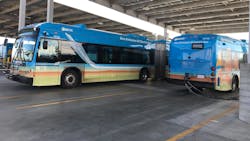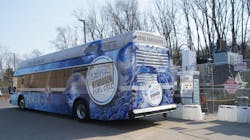Entire U.S. transit bus fleet could transition to zero emission at a cost of $56 billion to $89 billion
The transit bus fleet in the United States could transition to full zero-emission vehicles by 2035 at a cost of between $56.22 billion and $88.91 billion according to a new report from the Center for Transportation and the Environment (CTE).
The report assumes a mix of battery-electric vehicles and fuel cell vehicles will be needed to meet the transition target and accounts for vehicles used for service by transit agencies of all sizes, not just heavy-duty 30- to 60-foot buses. In both the low cost and high costs scenarios, the vehicles themselves account for between 51 percent and 59 percent of the costs, followed by infrastructure, technical assistance and Federal Transit Administration innovation and bus testing costs.
The report included “robust federal support for research, development and component testing” as part of the cost assessment, but also noted several policy areas where zero-emission fleet transition could be supported through actions at the Environmental Protection Agency, U.S. Department of Transportation, U.S. Department of Energy and Internal Revenue Service.
While the vehicles account for most of the cost in the scenarios, CTE noted two areas that would be central to successfully transitioning the U.S. transit fleet to zero emissions: Technology development and workforce development. CTE points out the federal government has been a leader in technology development, but notes “very little of its current funding supports vehicle technology development or [zero-emission buses] specifically.”
The report says technology breakthroughs are necessary, such as in battery and fuel cell technologies, to accelerate adoption of zero-emission vehicles. The report also recognizes federal testing programs will need to grow to support new zero-emission technologies.
Zero-emission vehicles have different operational characteristics versus conventionally fueled vehicles, which will propel a need for new workforce development requirements. The report states sustained workforce development will need to be in place for transit operators, technicians, engineers and planners as fleets evolve.
CTE produced the report at the request of U.S. Sens. Charles Schumer (D-NY) and Sherrod Brown (D-OH), who introduced their Clean Transit for America Plan on May 4. The proposal would provide $73 billion for the deployment of zero-emission buses by increasing funding for FTA’s Low or No Emission Vehicle Program. The proposal also calls for $60 million for a joint labor-management zero-emission workforce training consortium, as well as $500 million in FTA-administered funds to agencies to help with re-training.
The senators’ proposal increases the focus on the transit industry’s transition to zero-emission vehicles included in President Joe Biden’s American Jobs Plan, which calls for $25 billion to help transit agencies transition their fleets.
Sen. Brown, who was in Cincinnati, Ohio, last week with Vice President Kamala Harris highlighting the contributions of the transit industry, said his and Sen. Schumer’s proposal is a “transformative investment” that would provide jobs, connect people to opportunity and invest in communities.
“Americans deserve world-class public transportation that is delivered with modern, zero-emission buses built by American workers. Addressing climate change and reducing pollution is an opportunity to invest in American workers,” said Sen. Brown.
The full report is available for download and viewing on CTE's website.
About the Author

Mischa Wanek-Libman
Group Editorial Director
Mischa Wanek-Libman is director of communications with Transdev North America. She has more than 20 years of experience working in the transportation industry covering construction projects, engineering challenges, transit and rail operations and best practices.
Wanek-Libman has held top editorial positions at freight rail and public transportation business-to-business publications including as editor-in-chief and editorial director of Mass Transit from 2018-2024. She has been recognized for editorial excellence through her individual work, as well as for collaborative content.
She is an active member of the American Public Transportation Association's Marketing and Communications Committee and served 14 years as a Board Observer on the National Railroad Construction and Maintenance Association (NRC) Board of Directors.
She is a graduate of Drake University in Des Moines, Iowa, where she earned a Bachelor of Arts degree in Journalism and Mass Communication.

